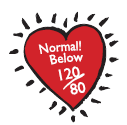Honoring the Gift of Heart Health for American Indians
Section Three - Help Your Heart! Control Your High Blood Pressure
Help Your Heart! Control Your High Blood Pressure
The Wisdom Family Takes Five Steps To Prevent or Control Blood Pressure
My Plan To Prevent or Control High Blood Pressure
Help Your Heart! Control Your High Blood Pressure
Did you know that controlling your blood pressure can lower your chances of a heart attack or stroke? This section will show you how to prevent or control high blood pressure.
Will Learns Important Facts About Blood Pressure
Will: "When I was diagnosed with high blood pressure, the doctor told me that I had to change my habits now if I wanted to be around to enjoy my family. By making small changes, I will start to feel better."
What Is Blood Pressure?
Blood pressure is the force of blood against the walls of your arteries. Blood pressure is needed to move the blood through your body so that blood can get to all parts of the body's organs.
Why Is High Blood Pressure Dangerous?
High blood pressure—also called hypertension—puts you at risk for heart disease. When your blood pressure is high, your heart has to work harder. High blood pressure is known as the "silent killer" because it has no symptoms. If not treated, high blood pressure increases your chances of:
- Stroke
- Heart attack
- Kidney problems
- Eye problems
- Death
Blood Pressure Numbers
Blood pressure is given as two numbers. The systolic number (as the heart beats) is on top. The diastolic number (as the heart relaxes between beats) is on the bottom. For example, 120/80 is expressed verbally as "120 over 80."
Will: "Getting my blood pressure checked was easy and didn't hurt. The numbers were my only warning that I had high blood pressure. My heart health card helps me to keep track of my numbers."
|
 |
Know Your Blood Pressure Numbers
- Have your blood pressure checked by a health care provider at least once a year. It is quick, easy, and painless.
- If you have high blood pressure, it should be checked more often at your doctor's office, neighborhood clinic, or at a health fair.
- Keep track of your numbers using the "My Heart Health Card."
The chart below shows normal, prehypertension, and high blood pressure numbers. Look at the chart below to see where you fit in.
Blood Pressure Chart
| Level |
Blood Pressure Numbers |
Results |
| Normal |
Below 120/80 |
Good for you!
Check your blood pressure once a year. |
| Prehypertension |
120/80 to 139/89 |
You are more likely to end up with high blood pressure.
Take action to prevent it. |
| High |
140/90 and above |
Ask your doctor how to lower it.
Check your blood pressure often. |
Next Page | Back to Table of Contents
U.S. DEPARTMENT OF HEALTH AND HUMAN SERVICES
Public Health Service
National Institutes of Health
National Heart, Lung, and Blood Institute
NIH Publication No. 08-6340
June 2008
|
